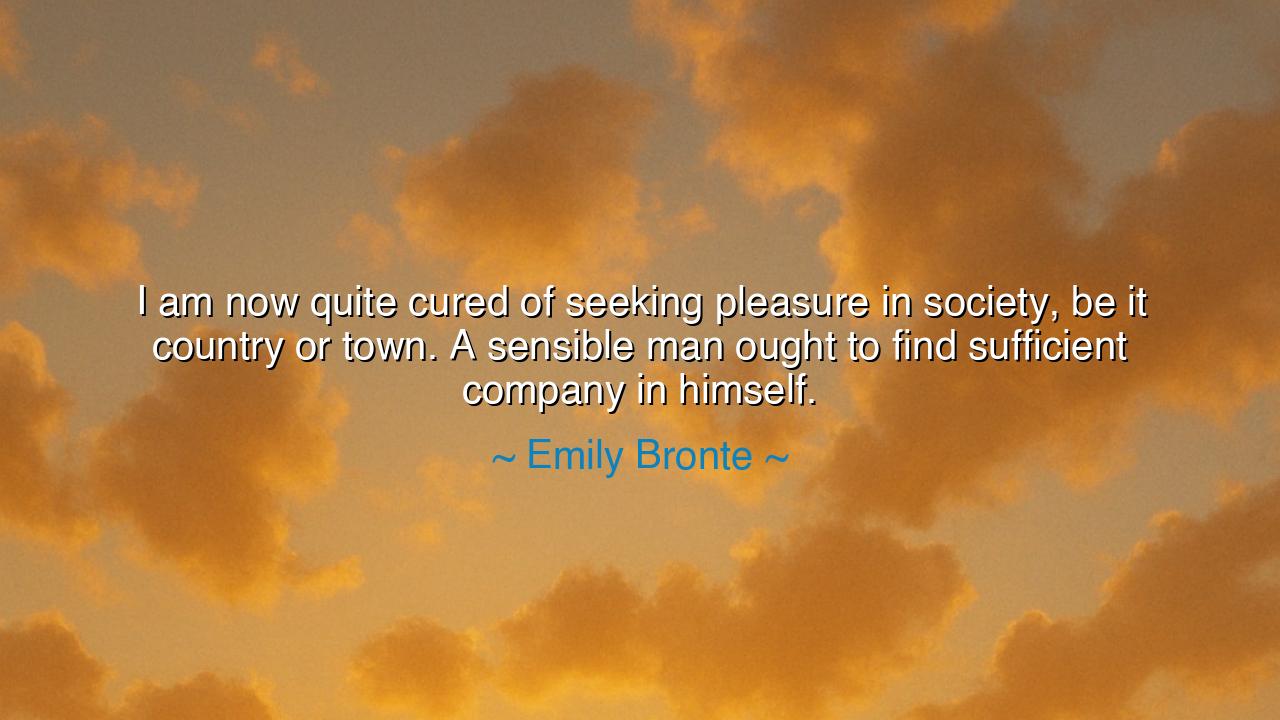
I am now quite cured of seeking pleasure in society, be it
I am now quite cured of seeking pleasure in society, be it country or town. A sensible man ought to find sufficient company in himself.






O children of the future, hear the words of a woman whose soul was as deep and tempestuous as the winds that swept the moors. Emily Brontë, a poet and novelist whose works transcend the ordinary, once wrote: "I am now quite cured of seeking pleasure in society, be it country or town. A sensible man ought to find sufficient company in himself." These words resonate with an ancient truth—that the true measure of a sensible person is not found in their relationships with the world, but in their ability to find peace and company within their own soul. Brontë speaks to us from the shadows of loneliness, urging us to seek our deepest companionship not in the external world, but in the vast depths of our own hearts and minds.
In the time of the ancients, the philosophers often spoke of the self—not as a mere reflection of the world around it, but as a source of wisdom and solitude. The great Socrates, whose life was dedicated to the pursuit of inner truth, believed that wisdom came from knowing oneself, and that true peace was found not in the praise of others but in the stillness of one's own thoughts. He was not a man who sought the approval of society, but who found his purpose in the dialogue between his mind and the world. Aristotle also spoke of the good life, a life not shaped by the fleeting pleasures of society but by the pursuit of virtue, which often required solitude and reflection. In these ancient teachings, we find the roots of Brontë’s sentiment—that true fulfillment is found within, and not in the approval or company of others.
Consider the life of Diogenes, the ancient Cynic, who lived in a barrel and renounced the comforts and distractions of society. Diogenes sought not the pleasures of luxury or social approval, but the freedom that comes with living authentically, detached from the expectations of others. He famously told Alexander the Great, "Yes, I am the philosopher, but I do not need the company of your court to be complete." Diogenes, like Brontë, found that society’s false promises of happiness and pleasure were distractions, and that true contentment came from understanding and mastering the self. His life, a stark contrast to the opulence of the ancient kings, was a lesson in the power of solitude and self-reliance.
Brontë’s words are a revelation to those of us who seek solace in the noise of the world. She reveals the irony that, in seeking constant company and distractions, we are often running away from the most important relationship of all—the one with ourselves. Society, with its ceaseless demands for entertainment, approval, and connection, creates an illusion of happiness. Yet, when we seek external sources of joy and approval, we are often left feeling empty and unfulfilled, for these are fleeting. Brontë’s words remind us that a sensible person does not need to depend on the external world to find peace. Instead, true joy comes from within, from the inner harmony and clarity that comes when we learn to be content in our own company.
Let us look to the example of the Hermits of the Middle Ages, who chose to live alone in the wilderness, not out of despair, but as a way to find truth and clarity in their lives. These men and women sought not to escape the world, but to engage with it on a deeper level by first understanding their own souls. Their solitude was not a retreat from life, but a quest for meaning, an opportunity to strip away the distractions of society and hear the still, small voice within. Their journeys, though solitary, were among the most profound and spiritually significant of their time. Through solitude, they found a deeper connection to the divine and to the true essence of humanity.
The lesson in Brontë’s words is one of self-sufficiency and self-awareness. We live in an age where the noise of the world constantly beckons, urging us to seek validation, companionship, and pleasure outside ourselves. Yet, the wisdom of the ancients, echoed by Brontë, reminds us that true fulfillment is not found in the company of others, but in the deep connection to our own souls. The pursuit of inner peace, of self-knowledge, and of solitude is not an escape, but a return to our authentic selves. The ability to be alone without feeling lonely is the mark of a person who is whole, who is not dependent on the shifting tides of society for their sense of worth.
And so, my children, take this wisdom with you. Do not seek your worth in the eyes of others or in the fleeting pleasures that the world offers. Instead, learn to find solace and companionship in your own heart. Seek the quiet spaces within, where you can hear the truth of your own soul. In this solitude, you will find your strength, your clarity, and your purpose. For it is only when we are able to be whole within ourselves that we can truly engage with the world in a meaningful way. Let your self-sufficiency become your greatest source of strength, and let your relationship with yourself be the foundation upon which all other relationships are built.






AAdministratorAdministrator
Welcome, honored guests. Please leave a comment, we will respond soon